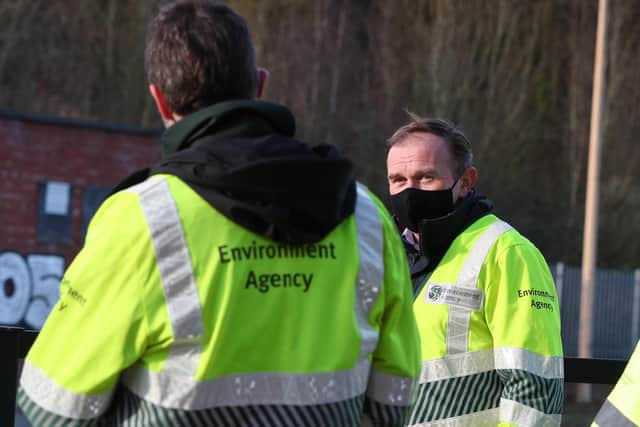Environment Agency workers launch weekend of strikes in ‘escalation’ of long-running pay dispute
and live on Freeview channel 276
Thousands of Environment Agency workers in England will strike this weekend in a long-running dispute over pay.
Unison said it will put communities, waters and wildlife at risk with the walk out takeing place from 7pm on Friday 14 April until 7am on Monday 17 April.
Advertisement
Hide AdAdvertisement
Hide AdThe union added that the strike a “significant escalation” of industrial action that began last year.
The latest strike will involve union members who work on coastal sea defences, protect communities from floods, tackle water pollution, waste fires and fly-tipping.


Unison accused the government of making no attempt to hold talks to resolve the row, despite months of strikes and other forms of industrial action.
The union said “endemic” low pay means the Environment Agency (EA) is struggling to hold on to experienced staff and recruit new employees. The government’s refusal to allow the Agency to improve a pay increase of 2% plus £345 given to staff in the autumn means workers have no alternative but to “reluctantly“ strike again.
Advertisement
Hide AdAdvertisement
Hide AdThe longer the government persists with its “do nothing” approach to staffing problems, the worse the situation will become, the union added.
Unison has written to Chancellor Jeremy Hunt urging him to intervene in the dispute and free up more money so the agency can pay its employees “fairly”. It is also calling on Environment Secretary Therese Coffey to hold pay talks with unions.
‘The damaging dispute could drag on for months’
Unison general secretary Christina McAnea said the dispute over wages has gone on for “far too long” and it is in “everyone’s interests” to “find the extra funding to secure essential services and hammer out a deal.”
She said: “There’s a strong danger that without government intervention the damaging dispute over this woeful wage increase could drag on for months. That would cause further discontent among staff and leave at-risk communities without proper protection.
Advertisement
Hide AdAdvertisement
Hide Ad“Uncompetitive pay has forced many of the lowest paid workers at the agency to quit for higher-waged work elsewhere. Others, in specialist technical roles, are also leaving for jobs where they feel their skills will be better recognised and their experience more valued.”
She added: “With environmental damage and rising pollution levels in the spotlight like never before, and climate change intensifying the pressure on services, this is no time to leave the agency understaffed.”
Unison’s head of environment, Donna Rowe-Merriman, said the government “needs a properly staffed Environment Agency if natural habitats and water sources are to be protected”.
She added: “Every community in England needs these experienced employees to help keep their local environment safe. All talk and very little action best describe the government’s approach to environmental policy. Announcements come and go, but nothing much happens to clean up England’s seas, rivers, lakes, and canals. This must change.”
Advertisement
Hide AdAdvertisement
Hide AdA Department for Environment, Food & Rural Affairs (Defra) spokesperson said the Environment Agency (EA) are “meeting regularly with unions to have conversations about pay, conditions and reform.”
An EA spokesperson said: “As a public sector organisation, the Environment Agency remains bound by the pay policy of the government of the day.
“We have plans in place to minimise disruption to our essential work to protect the environment and respond to critical incidents.”
Comment Guidelines
National World encourages reader discussion on our stories. User feedback, insights and back-and-forth exchanges add a rich layer of context to reporting. Please review our Community Guidelines before commenting.
